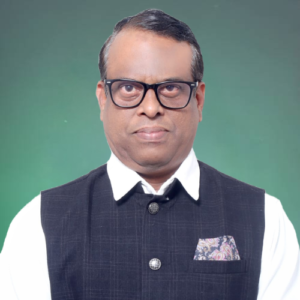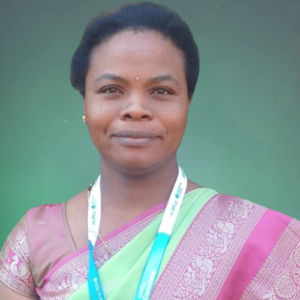Transforming Lives: Women Educators in Education

The cherysh Shiksha learning program trains local women to become Learning Facilitators. Mr. James D’Souza, a high school teacher from Haliyal, selects and trains these young, qualified women. The cherysh saadhan learning program has a fantastic initiative to develop local Learning Facilitators. They select and train young, qualified women from the community to become Shikshas’ educators. Mr. James D’Souza, a high school teacher from Haliyal, coordinates the training program. He brings his teaching experience from the local high school. He also has an impressive command of functional English from his studies at the Regional Institute of Language. Every week, they have training classes with lots of activities, songs, and plays. Many trainers have worked hard over the years. They provided hundreds of hours of coaching. With the support of the program, 37 young women from Haliyal have become confident educators. They now have regular incomes.
Training Sessions Enhance Learning Facilitators’ Skills

This academic year kicked off with training sessions for Learning Facilitators, thanks to The Meghshala Foundation. They focused on using the Meghshala App and teaching techniques, helping educators create a better learning environment for students in Haliyal. To start the academic year, several training sessions were conducted. Our Learning Facilitators attended these sessions, which were held in partnership with The Meghshala Foundation. Meghshala designs the digital learning modules that are taught in the Shikshas with the use of tablets. A few training sessions were held over the summer. They focused on the use of the Meghshala App and the accompanying study modules. Our learning facilitators are use the app on tablets they are provided with tablets to teach in the Shikshas. These training covered the different elements in the digital modules. They also explained how the learning facilitators can use them in Shikshas. In June, a two day training session was held and was conducted by Mr. Manjunath Hemapur of Meghshala. This training was more focused on teaching techniques outside of the app. It equipped our Learning Facilitators with more active tools to encourage learning in their Shikshas. They were taught a handful of group activities as a part of this. Some topics were covered to make the learning facilitators understand that each child learns at a different pace. It is important for the children to question and make mistakes to really learn. Our learning facilitators learned a lot about their role in creating a positive learning environment for their students. They understood how their behavior and seriousness are reflected in their students. These leanings will make the learning facilitators more efficient. Our Shikshas will also become more efficient in imparting learning. This improvement will enhance the quality of education available to the children in Haliyal.
KLE Tech University Students Transforming Villages Through RITE

Rural Innovation Through Education (RITE) is a collaborative volunteer initiative with KLE Tech University, where engineering students engage with children in Haliyal villages, with over sixty college students participating so far. Rural Innovation Through Education (RITE) is a volunteer programme, implemented in collaboration with KLE Tech University, Hubli. Engineering students from the University engage with the children in the villages of Haliyal through the programme. More than sixty college students have participated in the RITE programme so far.
Exploring Livelihood Strategies in Rural India

Exploring Livelihood Strategies in Rural India Last month, I assisted cherysh Trust’s educational projects in Haliyal, gaining insights into project management and community needs. The experience highlighted the importance of inclusive environments, challenges like unreliable electricity, and the determination of local women in sustainable development efforts. Hi, I’m Samantha Kennedy, an intern from the University of Ottawa. Last month, I visited Haliyal. I had the pleasure of lending a hand with cherysh Trust’s learning and livelihood projects in rural communities. It was an eye-opening experience. I gained valuable insights into project management through training, inspections, and a pilot evaluation project. The Meghshala training really motivated the learning facilitators to take their roles seriously and appreciate the importance of their work. It was great to see the young mothers being accommodated. They were allowed to bring their children along, creating a welcoming and inclusive environment for collaboration and empowerment. We conducted a pilot project to assess the impact of after-school learning programs on students. Pilot projects are a great way to find potential issues and build a successful program. We also visited villages to watch how Shiksha runs and uses cherysh’s learning tools. Tablets are a fantastic way to expose children to innovative learning. Nonetheless, the unreliable electricity can make it difficult to update and charge them. I had never experienced this challenge before. It really opened my eyes to how it affects access to education. I also had the chance to meet and interview the women group that cultivates sugarcane buds. Nurseries, a successful livelihood project run by cherysh, provided firsthand insights. I learned about its successes, challenges, and future prospects from the women who are directly affected. This understanding is crucial for creating a program that meets the needs of the community and promotes sustainable development. My extended stay really gave me a deeper understanding of how the program is being implemented. I talked to the community members. I identified areas where we could offer support. I also observed the challenges they’re facing. Despite the difficulties, the women’s determination to build a better life was truly inspiring. The warm hospitality and kindness of the community really showcased their beauty. Being in a different environment really broadened my perspective on international development. My visit to Haliyal was an absolute pleasure, and I’m so grateful for the support that made it possible.
Empowering Kids Through Community Learning Spaces

Cherysh Shiksha After School Learning Centres target all-round development of children through quality support to their learning needs. The cherysh Shikshas aim to foster village neighborhood learning spaces. These include community homes or common rooms. In these spaces, children can learn, aspire, and progress. Selected and trained community women serve as Learning Facilitators. The Shikshas offer augmented learning support to over a thousand children through an Active Rural Curriculum. This curriculum incorporates activity-rich approaches like music, art, puppetry, and games to teach English and Math. Phonics-based English learning is followed, with Learning Facilitators using phonics modules on digital devices in their classrooms. This program builds a strong foundation for English, the most challenging topic for rural Indian students. Beyond English, children get help with schoolwork, revision, and exam preparation. A day is dedicated to sports and physical activities, with all Shikshas equipped with sports kits. Arts and creative skills workshops are conducted in all Shikshas. They offer hands-on practice in clay modeling, paper crafts, and creative writing. Participants also engage in plays, songs, and dance. These activities are led by experienced trainers. From 2015 to 2019, cherysh covered 26 villages, with 37 Shikshas, 37 Learning Facilitators, and over a 1000 children enrolled. Future plans include expanding to more villages in the region.
Empowering Education: Tackling Digital Disparities Post-Covid

Tech is the future, and we are introducing computer science through infrastructure and education in the villages of Haliyal district, Karnataka. The Covid-19 pandemic highlighted the paramount importance of technology in the education sector. Urban schools and colleges successfully transitioned to online learning platforms. Rural areas faced significant challenges due to limited infrastructure. They also struggled with technical skills. We identified disparities that necessitated attention. Thus, we established a collaborative partnership with The PiJam Foundation. Our goal is to transform eight Shiksha Centers into digital learning hubs. These centers will use low-cost, open-source technology and Raspberry Pis to foster computer literacy among students. The curriculum will encompass Physical Computing, Programming, and Digital Making, equipping students with essential problem-solving and design thinking skills. Learning Facilitators will undergo comprehensive training over a year to transform into Tech-Learning Facilitators. This initiative aims to enhance computer science knowledge among girls and Learning Facilitators. It ensures their preparedness for the evolving digital landscape. ThoughtWorks and Innovative Technology Trust generously supported this transformational project.
Enhancing Teaching Quality with CherYsh and CFTE

CherYsh collaborates with CFTE and Ontum Education Pvt. Ltd. to deliver innovative digital education. Meghshala’s STEAM (STEM + Art) modules align with CherYsh’s goals, offering e-lessons enriched with images, videos, and strategies. The content is accessible offline via tablets used by our Learning Facilitators, thereby ensuring learning continuity even in areas with limited internet access
Digital Tools Transforming Education in Shikshas

Technology enhances learning in shikshas by equipping Learning Facilitators with digital tablets for e-learning, facilitating audio-visual teaching, and enabling online attendance tracking for efficient education management. Technology is used extensively to make learning more efficient in the shikshas. Each Learning Facilitator is equipped with digital tablet in which e-learning modules are made available. Facilitators use the tablet to aid teaching with audio visual content and thereby make learning easy and interesting. The online attendance tracking system is enabled such that Learning Facilitators can record attendance on their digital devices, daily. Foundation and refresher training are conducted at regular intervals
CherYsh Skilling & Entrepreneur Program

Women empowerment is one of the cornerstone principles at CherYsh. Some pivotal programs under this principle are the “CherYsh Skilling Program” and the “CherYsh Entrepreneur Program.” These programs empower women and help them escape agricultural bondage and debt cycles, enabling them to sustain their families and support their children’s education through CherYsh’s after-school learning programs. These efforts uplift communities by improving living standards and promoting financial independence. With a strong presence across 50+ villages, CherYsh continues to foster economic resilience by empowering rural women, nurturing their potential, and ensuring long-term sustainability for their ventures. CherYsh is addressing the challenges faced by rural women in Haliyal district, including limited work opportunities, underutilized skills, and barriers to market access. An example is quilt making, while a valuable skill, is labour-intensive and often unsustainable due to insufficient demand. To tackle these issues, CherYsh has launched an Entrepreneurship Development Program aimed at empowering women to build sustainable businesses. The program includes training in business development, financial literacy, project writing, and marketing strategies. Partnerships with organizations like KLE Tech University, Selco and the Deshpande Foundation provide mentorship and support to help women establish and manage sustainable enterprises. Additionally, the program offers financial literacy training, scheme orientation, and market linkages, indirectly benefiting over 200 women. Key Initiatives for Women’s Livelihoods Rural Teaching A Flagship Program: Learning Facilitators & Technology Educators: CherYsh has developed one of the most recognized Learning Facilitator (LF) & Master Trainer programs in rural India, partnering with esteemed institutions to ensure excellence in training. Key collaborators include: Transformational young women that aspire to be confident educators from Haliyal’s rural communities are selected for a rigorous 12-month LF program. The curriculum focuses on pedagogy, technology, and subject expertise in English, Math, and Computing. Weekly coaching sessions ensure participants develop into capable educators with regular incomes. Innovative Training Approach This flagship program not only empowers women with teaching skills but also transforms them into independent, confident contributors to their families and communities.
CherYsh Entrepreneur Program

Women empowerment is one of the cornerstone principles at CherYsh. Another pivotal program under this principle is the “CherYsh Entrepreneur Program.” CherYsh’s primary objective is to identify and develop the skills and potential of rural women, enabling them to engage in home-based industries and entrepreneurial endeavours. Through this program, economic empowerment is fostered, thereby elevating the standard of living for families and contributing to the continued education of their children. Entrepreneurship Development Program (EDP) CherYsh has established a robust grassroots presence in over 50 villages within Haliyal Taluk, launching the Entrepreneurial Development Program (EDP) to empower rural women entrepreneurs. This initiative provides comprehensive training in business development, financial literacy, project writing, and marketing strategies. In response to the economic challenges posed by the COVID-19 pandemic and regional floods, the program supports women who are eager to contribute financially but lack the resources or guidance to establish businesses. Through collaborative partnerships with esteemed organizations such as KLE Tech University, Selco, and the Deshpande Foundation, CherYsh empowers women to establish resilient enterprises. Participants are provided with two years of uninterrupted mentorship and support, ensuring their success. Furthermore, financial literacy training and market linkage assistance indirectly benefit over 1000 women, contributing to a broader community impact. Retail Food Products: Empowering Women Through Community Kitchens Launched in 2013 in collaboration with the Roviralta Foundation, the CherYsh Community Kitchen Program has surpassed our initial expectations over the past decade. This program has fostered new partnerships with esteemed organizations such as Taj Hotels, Akshaya Patra, EID Parrys, Murugappa Group, Selco Foundation, and Buzz Women India. The program empowers rural women to utilize their culinary expertise through home-based enterprises, thereby generating income and enabling them to support their families and ensure their children’s education. Participants from Haliyal received comprehensive training in food hygiene, business management, and finance through classroom programs facilitated by Buzz Women India. Additionally, they gained practical insights through visits to the Taj Gateway Hotel Kitchen and the Akshaya Patra community kitchen. These visits provided them with exposure to best practices in large-scale cooking, packaging, and hygiene. In collaboration with EID Parrys and Murugappa Group, the program secured daily food supply orders for cafeteria workers. Over the past decade, this initiative has significantly transformed the lives of hundreds of women, providing them with sustainable livelihood opportunities within the Haliyal region. The Community Kitchen Program remains dedicated to empowering rural women, transforming their acquired skills into viable and sustainable livelihoods. This initiative fosters independence, financial stability, and ensures the continued education of their children. Program Objectives Program Highlights CherYsh partnered with the Center for Entrepreneurship Development of Karnataka (CEDOK) to provide entrepreneurship training to over 100 women from rural Haliyal. Through this program, participants acquired essential skills in business development, project writing, marketing, and financial management, equipping them with the knowledge and abilities to establish and manage their own enterprises successfully. What People Say “As the Education Coordinator at the Block Education Office, I’ve collaborated with CherYsh for seven years. When CherYsh sought English training for their Learning Facilitators, we partnered to launch the Learning Facilitator Training Program. This initiative addressed the education gap and provided valuable employment opportunities for young women in the region.” James Dsouza, Education Co-ordinator, BEO, Haliyal “CherYsh, a non-governmental organization, has collaborated with Deshpande Pvt. Industrial Training Institute to promote education and skill development. Their partnership has been successful in empowering women in Haliyal district, leading to increased household income and improved education standards in their villages.” Mr. Prakash Prabhu, Chief officer, Deshpande Trust “I’ve been a Learning Facilitator with Shiksha for six years. After completing my 12th standard, my family didn’t support my dream of continuing education, so I married. Joining CherYsh was a life-changing opportunity. I’m grateful for the chance to share knowledge and positively impact the children’s education. When I’m with my students, I’m fully immersed in their learning.” Mangala Mirash, Learning facilitator of the Shiksha program, Sathnalli village










